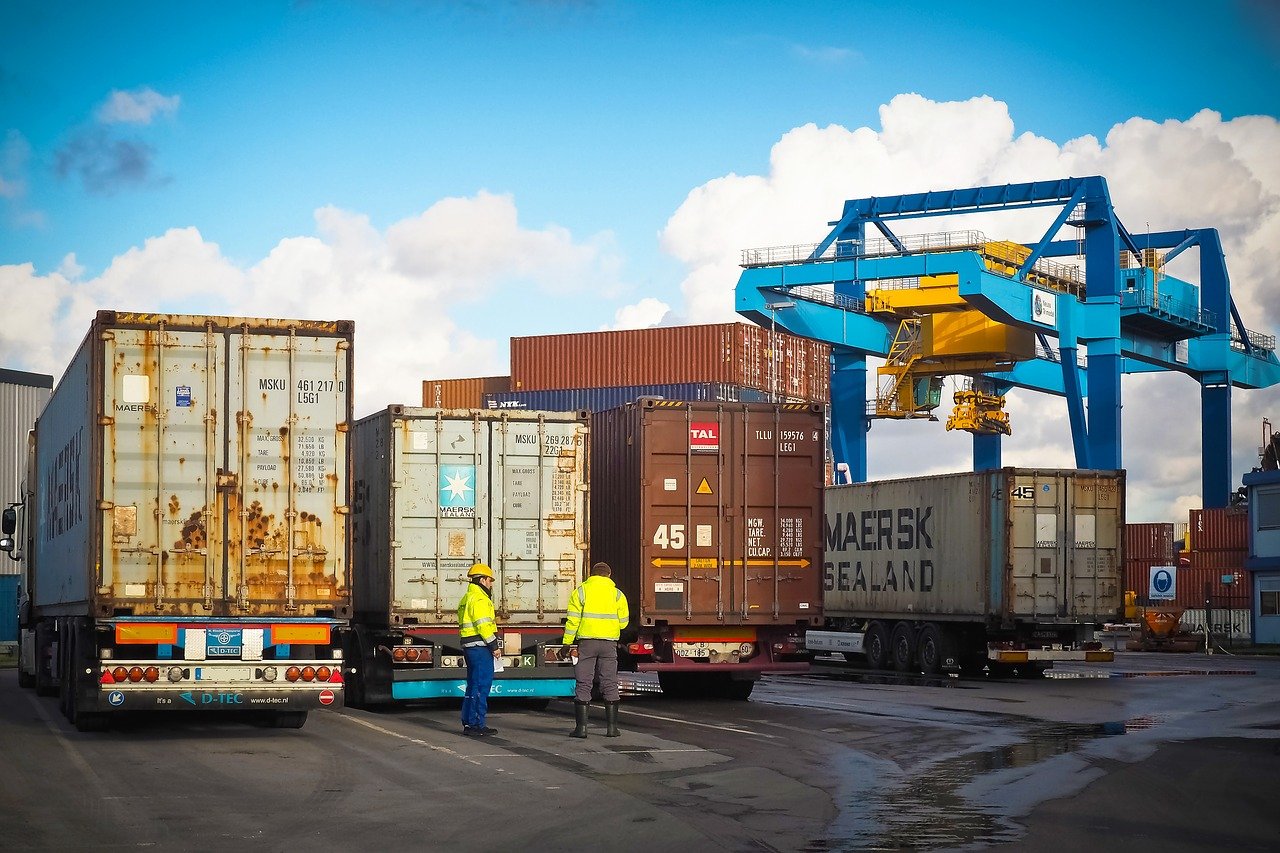
#PlasticFreeJuly – How HGV Drivers Can Get Involved
This blog talks about plastic free July, with tips on how HGV drivers can help contribute

This blog talks about plastic free July, with tips on how HGV drivers can help contribute

This blog talks about how HGV drivers can stay connected with friends and family, whilst on the road

1 in 6 people are affected by mental health issues every week, but many of them don’t get the help that they need because of the social stigma surrounding the issue.
In the transport industry, driver safety is often at the forefront of sector issues – but it should go beyond just physical safety. A driver’s well-being is equally important to ensure a positive and healthy mental state. After all, driving can be a lonely profession, especially for those trunking for long periods of time.
Long-haul work can see drivers spending long hours on the road – so it’s time that the transport industry stepped up and started focusing on the mental health and wellness of all drivers on the road and beat that social stigma to encourage those who need it to seek out the help that they need!
Here at Drivers Direct, we care about the metal wellbeing of our employees as well as everyone else in the logistics business, so here are our top 10 ways drivers can look after their mental health on the road…
‘Stop, revive, survive’ isn’t just a catchy phrase – taking a break while driving is essential! Make sure to follow your required rest breaks and stop when you need to. Pulling up where possible, stretching your legs and getting some fresh air can go a long way to boosting your mood.
Even something as simple as eating breakfast each morning before you leave can give your working day some much needed structure and familiarity. Romanticise your routine, take the time to make yourself a brew, get something in your stomach, wash your face stretch your legs and plan your day.
Driving on remote or rural roads can be long, tough, and lonely. Take the time to rest and reach out to your loved ones, whether that be a family or a friend. A familiar voice can boost your mood and help you feel more connected.
Singing while on the road isn’t just for fun – it can also keep you awake, alert and stress-free. Compile a playlist of your favourites tunes and sing along to relieve your stress. We even have a playlist for those who haven’t got time to create their own!
Having fast food everyday just isn’t healthy as we all know. But what you may now know is that a good diet is not only great for your physical health but also your mental health. Pack what you can from home and choose the healthier option when picking up food for the road – you’ll thank yourself later.
Drinking water is essential to keeping up your health and mood. When you’re taking on a long-haul drive, you’ll need a lot of water to keep you going. Make sure you’re loaded up before you set out and remember to sip often to keep up your levels.
Track your work and rest hours in great detail. Restrictions on this are there for a reason. Any work done outside of this is at high risk of causing fatigue and other health issues. Keeping track of your work hours is important, as is limiting your personal driving time to ensure you’re well rested and focused for your next shift. Getting tired on the road is not only dangerous for you but for everyone on the road with you. Don’t burnout. Know when to take time away from it all so your mental health can stay above water.
Suffering in silence is dangerous. Talking to your partner, friend, co-worker, or manager can relieve your burden and help you manage any issues you have. Honesty is the best policy, and it might just save your life.
Even if it’s as simple as noting down how you feel on a scale of 1-10, it can be beneficial to track your mood and determine what and when changes occur. It can also be a therapeutic practice for some, the ability to write their thoughts and feelings down to get things of their chest is often very beneficial for relieving any pent-up stress.
If the stress of a job is getting to be too much, always remember to take some long, deep breaths. Spend a few minutes doing this, and you’ll get yourself back on track and in control of your mind.
At the end of the day, stress is unavoidable but employing just a few of these tips will reduce your stress and help you manage any negative emotions or experiences.
If you are struggling or need someone to talk to there are many ways to reach out and get help:
Samaritans – Confidential support for people experiencing feelings of distress or despair. Phone: 116 123 (free 24-hour helpline). Website: www.samaritans.org
CALM – CALM is the Campaign Against Living Miserably, for men aged 15 to 35. Phone: 0800 58 58 58 (daily, 5pm to midnight). Website: www.thecalmzone.net
Looking for more tips for being on the road? Check out some of our previous blogs.

Looking to make your first foray into the world of work? Maybe you’re considering a move to university, but aren’t sure what to study? You wouldn’t be blamed for being unsure of what to do with regards to your future – there are so many options out there, each with their own pros and cons lists!
For those considering a career in the logistics industry, here are 5 reasons to choose an apprenticeship in transport. With a bit of luck, you’ll be knocking on our door soon!
University is not for everyone, but sadly it is often touted as the be all and end all when it comes to the next step young people should take after finishing their studying. While there are many valid reasons for choosing to pursue a degree, there are other options available to you – and many reasons why you might not feel like studying for another 3 years, minimum!
From the large fees to the heavy workloads, university isn’t an attractive option for some people. Fortunately, apprenticeships don’t require any fees – in fact, you are paid while you learn! It’s a great way of starting to earn money whilst bypassing the loans that a degree would cost you, while giving you a head start in the work force.
Provided you’re reliable, keen to learn, and work well with others, there’s little chance you won’t be guaranteed a job after an apprenticeship in transport. That’s not just due to the current drivers shortage in the UK! HGV drivers will always be needed, so you’re unlikely to have to struggle through the hiring process.
There’s also the likelihood that you’ll be hired by the company that’s going to provide your apprenticeship. While this isn’t always a guarantee, it’s the perfect chance to prove yourself!
Further education might provide someone with a qualification, but it doesn’t necessarily provide them with the transferable skills needed in the world of employment – so-called ‘soft skills.’ From working in a team, to dealing with customers and clients, there are some things that simply can’t be replicated in a classroom.
You’ll be able to take the skills learned in a transport apprenticeship forth throughout your entire working life, making connections with others and developing your personal abilities. It’s a win-win!
You might be truly stuck as to what to do with your career, but the beauty of apprenticeships is that it provides you with thinking time. If you don’t like the one you’ve chosen to do, then there’s no need to panic! You can always change your mind.
There are many different options out there for you, from practical work to less traditional avenues. You can do an apprenticeship in almost anything nowadays, so even if you opt out of your original plan, there’s nothing lost but a bit of time. You may end up finding that you want to go to university after all – which many people do after spending some time in the work force. Apprenticeships are still an important stepping stone to getting you where you need to go.
Finally, you’d be equipping yourself with a great career path. We might be a little biased, but we think that working in logistics is a fulfilling career that provides you with camaraderie, job satisfaction and great security! Why not give it a go and see if it’s for you?
Plus, it’s a great option for younger people too. Just take this story for example, of 19 year old Jack who loves his career in transport.
At Drivers Direct, we’re dedicated to providing a great working environment for our employees. To learn more about working for us, head to our contact page. Be sure to follow us on Twitter and LinkedIn, too!

Logistics recruitment companies play an important role in the supply chain, and choosing the right provider will help to determine the effectiveness, reliability, and efficiency of your operation. Behind every reliable provider, there’s a team of skilled drivers and logistics professionals to help your product get from A to B without a hitch. That’s why it’s important to think about who you want to work with. A well-chosen provider should form a seamless extension to your transport operation.
At Drivers Direct, we place drivers into temporary and permanent driving roles across a wide, diverse, and loyal client base each week. Our clients include logistics businesses up and down the country that need support with their recruitment strategies. We are one of several businesses that run a similar operation, so what should you look for in a logistics agency like ourselves?
What is it that you want out of a logistics partnership? What are your short- and long-term needs? It goes without saying that recruitment companies in the transport sector should have a track record of providing a high quality and efficient service. It is likely that logistics companies will need drivers at very short notice so it is important that your chosen agency is contactable 24/7, like we are at Drivers Direct.
Your chosen company should also have expertise in the areas that meet your needs when it comes to staffing, whether that be HIAB, ADR, flatbed, trunking, fridge work or multi-drop as well as clear knowledge and understanding as to what it is that you and your company actually do.
In order to make the best choice, you have to analyse exactly what your needs are. What is the number of drivers that you may need, how long is it likely that you will need them for, what is the lead time that you can give your chosen supplier?
Another key consideration is picking an agency provider with a presence within a reasonable distance from your dept. It is more likely that the agency will have a pool of tried and tested drivers if they are local to you. Drivers Direct have a network coverage across the UK so it is likely that wherever your depot or company is based in the UK we will have a branch nearby.
Another important factor you’ll want to consider is how much experience the logistics recruitment business has and how stable their organisation is. Regardless of the complexity of your own supply chain, it is always better to go with a company that has a few years under its belt.
Not only will this ensure that they thoroughly understand the industry and can deal with any problems that crop up, but it will also mean that the organisation is relatively stable and not likely to shut down or go out of business at a crucial time, leaving your shipments stranded.
Did you know this year marks our twentieth year in business? Keep an eye on our Twitter and LinkedIn for all the celebrations we’ll no doubt be having!
With consumers’ patience thinning and demand for product growing, speed and reliability are two of the most important things to consider when choosing a logistics recruitment provider. With next-day delivery available nationwide and same-day delivery on the rise, e-commerce companies across the UK are competing to make consumption easier than ever. These promises of delivery fall on the shoulders of logistics providers, so it’s pretty important to partner with one who can deliver (no pun intended).
The products also need to be delivered in excellent condition, as the cost of replacements and refunds can be very high if any damage occurs in transit.
These are two main areas that any good logistics recruitment agency will take into consideration. With the ongoing challenges of the driver shortage, this has proved very important indeed.
Customer service is very important in this day and age. You’ll want to choose a logistics provider that prioritises customer service and provides honest and accurate information in real-time. The company should be responsive, with effective problem-solving mechanisms in place for anything that should occur. They also need to manage fluid lines of communication and consider customer service above all else.
Doing your homework in this regard will definitely pay off in the long run. Be sure to ask for references and testimonials from past customers or employees. Here’s a testimonial from one of our employees:
“I have worked for Drivers Direct exclusively for 3 years now. Before DD I had worked for the usual agencies that treat you badly, don’t pay you on time, and never even consider that you are actually a person, not just a cash cow! In the past 3 years, I have never not been paid on time, I have never not had work and any questions I have had have been answered promptly and professionally. They have supported me through family bereavement, through Illness and through other hardships. I have loved every minute of working for DD, but the thing that makes the difference is the people. Without the staff at Drivers Direct you would simply be another agency. It’s your people in the office that transforms you into a tier 1 agency.”
Those were some of the most important things to consider when it comes to choosing a logistics company. Making the right choice is crucial for you and the success of your business, so take your time and do your research. We can’t help but be a little biased when we say that our services are exceptional and should you want to know more you can check out our website or get in touch via our social media (Twitter, LinkedIn) or call us on 01928 572200.

Thinking about getting your foot on the logistics ladder? You’re not alone. Since early 2020 the focus has been on logistics to keep the country running during the hardest of times. The sector’s resilience over the past 18 months has shown it to be an attractive career choice.
The pandemic has increased the importance of the supply chain, and strengthened the need for job seekers to improve their supply chain skill sets. The focus on logistics is bound to increase as top business brains grapple with ways to control the havoc wrought by the pandemic and plot a way forward so that these lessons can be learned for good.
In the simplest terms, those connected to the supply chain industry are involved in one way or another in contributing to, or managing the process of, making or procuring goods and ensuring they reach the end-customer on time and in good order, with customer satisfaction and profitability being a priority.
What is the Entry Point for Supply Chain Jobs?
But how can you get into logistics? There are numerous ways to get your foot in the door early on, or even break into the industry at entry-level:
Using a Recruitment Agency
When starting out, many people talk to recruiting companies and head-hunters. This is of particular benefit if you wish to test the waters before committing to one job and one employer. A recruitment agency may be able to find you a temporary position, which, if you prove to be a good fit with the company, could lead to a permanent job.
Networking
Look out for industry-type events in your area, as these provide an opportunity for you to meet lots of people. Speak to as many professionals as you can—discuss your various options with them. And don’t be afraid to ask their advice on how to start out in the industry.
Marketing Yourself
LinkedIn is the best platform for this. Put your profile up so that managers can find you. Be sure to include all the keywords for the type of work you want to do. Recruiters and managers are increasingly using social media, LinkedIn in particular, to assess prospective candidates through their links and posts. You can significantly raise your profile by writing and sharing posts—the more the merrier. You can also use LinkedIn to scour the many logistics jobs that are advertised on the platform.
Some of the best ways to get stuck in are through logistics companies. You could pick up a job as a warehouse picker, a forklift driver, or even a truck driver. If you lack the qualifications to drive a HGV, don’t worry, pass schemes are easy enough to find and relatively affordable. Many companies are even offering joining incentives which often make up for the cost of training.
Whichever way you decide to join us, welcome! The logistics industry is a great place to work. Join the conversation over on our Twitter or LinkedIn pages and let us know how you got into the industry. For more blogs, click here.

Logistics, and transport management, are dynamic careers with many roles needing to be filled at the moment. In order to keep the supply chain moving, every part must work in sync with each other, however, not all elements are so straightforward.
Luckily, the logistics sector covers a wide range of jobs. So, whatever experience you may hold, there is sure to be something you can excel at within the industry. Below, we detail the skills and career backgrounds, both generic and specific, that might make you perfect the perfect candidate for a career in transport.
Whatever your employment and educational background, we’ve found that the essential skills for a career in logistics include:
Excellent written and verbal skills are also required in most areas supported by the ability to present thoughts clearly and convincingly.
Information technology plays a key role in the management of the supply chain and is an equally important tool to those involved in transport management planning, as well as those in warehousing. All organisations now use some form of information technology to store data and information. Management information systems (MIS) are at the centre of everything we do, but you should not be put off if you are not ‘good with technology’. There are always people to guide you if you have limited experience with these kinds of things.
There is a strong emphasis on the importance of customer care across the sector, and an ability to see the picture from both sides is a useful skill. Drivers and warehouse workers will also benefit from good interpersonal skills. Meeting and interacting with people multiple times a day is part of the job, especially during loading and unloading stops. Good communication skills are also paramount as you will need to ensure that those you deal with always understand what you mean and vice versa.
The modern workplace can be a demanding environment that requires people to think on their feet to meet the daily challenges that come their way. People can get stuck in their ways and fall victim to their own experiences however, those who lack it may also face difficulties. So, which is the right choice? Simply put, there is no clear answer, as long as you can evidence that you perform in areas required for the job, then we believe that the logistics industry will be the perfect canvas for your skillset. To date, we’ve found that career backgrounds in the following areas create an ideal candidate for our industry:
Numeracy – with increasing sophistication, the need for numeracy becomes more essential and whilst not necessarily looking for a mathematics graduate, the ability to understand and analyse data, as well as manage your hours and invoices, is very important.
Problem-solving – the ability to analyse the hard facts, the hunches and hearsay, and arrive at a logical, workable conclusion (often to do with delivery routes)
Project management – such skills are of growing importance across both logistics and transport as people increasingly work in cross-functional teams
And for those aiming for the cab in particular, a valid HGV licence (as well as a real passion for the open road) will truly take you places, both literally and figuratively!
Sound like a tall order? Despite the rapid rate of change in logistics and transport, common sense and a positive attitude will take you a long way in what is a very rewarding and satisfying career. If you’re interested, we specialise in the recruitment of drivers into both temporary and permanent HGV and LGV roles. You can get in touch with our very friendly team by emailing admin@driversdirect.co.uk.

You’d be forgiven for thinking that, after leaving school, your only option is to go to university in order to find a career you enjoy, or make a decent living. But this simply isn’t the case!
Here’s why there’s no reason not to consider a career in logistics in place of going to university.
Spend wisely
It is true that the number of people going to university in the UK has increased in recent years. Data shows that in 1990, the number of people going to university stood at less than 20%. That number has now more than doubled to 40%.
However, in that time the monetary cost of going to university has also exponentially increased. In 1998,university fees were introduced at £1000 per year, where they had previously been free. In 2004 they were raised to £3000, now converted into loans repayable on an income-contingent basis. After the 2010 election, the basis of university finance was radically transformed, as student fees were raised to £9000.
Though university is often an essential road to go down for those pursuing particular careers, such as in scientific fields, medicine, law and academia, there are often other viable options for those who are looking into a career that doesn’t require degrees. Apprenticeships and training courses are great ways to learn new skills without spending 3 years studying – and don’t come with the costly fees of a university degree.
A logistics career doesn’t require a degree – for the full list of requirements, head to the government website.
Opportunity knocks
Currently, there is a nationwide shortage of HGV drivers. That means there’s a likelihood you’ll be able to find a job with hours and a wage that suits you. For example, you might be limited to only working certain days, or may be looking for a temporary role while you consider what you want to do in the future. The great thing is that you can do this while providing an exceptional service as a key worker.
A common struggle amongst those who have left university is the scarcity of roles that are available for new graduates. Sometimes, those with degrees find themselves unable to find a role for months or even years after finishing university – and even the role that they do find might not be the kind they had in mind, often not relating to their specialised subject.
It’s important to really think about what you want to do in the future, and there’s no rush to go to university: while 18 might be the most common age to attend, there’s no reason at all that you can’t go a little further down the line. In the meantime, you might just find the career you’d like to be in for life in the form of an HGV driver.
For more reasons why you should consider a career in driving, check out our other blogs! And for regular updates on the world of logistics, be sure to follow us on Twitter and LinkedIn.

The impact of the logistics sector on the UK economy is seemingly simple to understand, but its importance is, unfortunately, regularly overlooked. With this being the case, it’s easy to ignore the catastrophic snowball of events that a driver shortage can lead to. Without goods making it to their intended destination, supermarkets and restaurants aren’t able to serve food, shops aren’t able to sell their wares, prices for goods increase, and small businesses are no longer able to compete with larger competitors that have the ability to pay more for merchandise. In short — the entire economy quickly slips into a rut that has the potential to turn into something much larger and we’re already seeing that issue today. Only recently has the sheer impact of the driver shortage been fully contextualised, one only needs to take a look at the empty supermarket shelves to understand.
The driver shortage in the UK has reached a critical high, with demand increasing across supply chains as the country recovers from Covid-19. The logistics industry is currently experiencing an estimated shortfall of around 100,000 HGV drivers due to the pandemic and following Brexit.
At this point, figures are too damning to be overlooked. Aside from the obvious lack of food and supplies, there are many other knock-on effects the driver shortage can have on the UK. Below, we explore this, and cover why the current driver shortage, shouldn’t be overlooked as an ongoing and serious problem.
Currently, lorry drivers are planning a nationwide strike over their working conditions, promising to wreak even more havoc on the already stunted supply chain. The proposed “stay at home” day next month is a response to low pay and poor working conditions. The event is designed to compound the effect of the UK’s lorry-driver shortage, which is continuing to cause widespread stock shortages across the country. A whole day of reduced deliveries will certainly magnify food shortages and cripple the country’s already damaged supply chains. So far, the “stay at home” pledge on 23rd August has attracted nearly 3,000 HGV drivers with another 340 joining last week.
If the situation continues, it’s possible that local retailers will begin experiencing missed shipments. Shelves will not be fully stocked, and if these products aren’t quickly restocked, many consumers may turn to larger stores to find what they’re looking for. Therefore, small businesses may be in an even larger bind, possibly resulting in loss of jobs for their employees. The driver shortage should not be overlooked for this reason, not now or not ever. The skills gap and lack of HGV talent is an ongoing issue, and one that needs to be tackled.
The majority of British diets are based on foods that aren’t grown locally; meaning that hauliers often deliver food from suppliers hundreds of miles away and even overseas. If a producer is unable to find a driver to transport their goods, they might lose them. Highly perishable foods such as fruits, vegetables, fresh meat, milk, and eggs would likely see a significant price hike due to the higher cost of delivery.
The effects of Brexit are believed to have forced around 25,000 truckers to return to the EU.
This issue can’t be solved overnight. Even by allowing eastern European drivers to enter the UK on short-term work visas, the shortage is still going to take at least an estimated six months to two years to fix. This means a lack of imported goods all the while. Those nice oranges we import from Spain and the entire Amazon EU directory, we will have to go without.
The current driver shortage debacle only highlights a wider problem in the industry, and one that we at Driver’s Direct are actively hoping to tackle by recruiting fresh talent in the sector. We cannot afford to overlook this anymore. Have your say via Twitter or LinkedIn and have your say. For more information on what we do, visit ou

Clean Air Zones, also known as CAZs, are areas of controlled traffic imposed by local authorities in an attempt to improve air quality. Most commonly found in city centres, CAZs were first proposed in 2015 but only came into force this year. The UK government’s target of a near “net zero” emissions rate by 2050 is thought to be reached with the addition of these new tariffed zones.
The restrictions enforced in Clean Air Zones will be applied not only to non-compliant HGVs but also buses, taxis and most recently, private vehicles. This recent announcement came as a shock to many residents living and working in areas where CAZs have been proposed, but for logistics businesses, we have known for a long time that these restrictions will have an effect on our industry.
Cleaner air is a universally desired outcome, with global warming at a rapid rate, there is no contest that creating an eco-friendly environment is something we should all strive towards. A huge reduction in road emissions is not just a pipe dream but the question has to be asked, are Clean Air Zones the best way to approach this?
PROS:
Certain Vehicles Are Exempt from Fees
Compliant vehicles will remain able to enter these zones free of charge; for HGV’s this includes Euro 6 engines, which are defined by all vehicles with 14 plate or newer. Buses and coaches that meet Euro VI emission standards, as well as cars, vans and taxis that meet Euro 6 (for diesel engines) or Euro 4 (for petrol engines) are also exempt, that’s as well as any ultra-low emission vehicles with a significate zero-emission range.
Good Deterrents
Clean Air Zones will promptly work as a deterrent for many non-essential journeys, resulting in some drivers avoiding major areas that are suffering from high emissions and major build-up. This could lessen congestion in city centres and leave it open for modes of public transport to run more efficiently.
Apparent Health Benefits
Studies of low emission zones in Germany found significant reductions in particulate matter (PM), which are tiny particles in the air that can get into the lungs and cause health problems. Continued exposure to this form of pollution as it only increases without the introduction of CAZ restrictions, could see a rise in the number of poor health cases related to pollutants.
CONS:
Financial Implications on The Logistics Industry
HGV’s are set to face steep fees ranging from £50-£100 per day in some cities. The safe transport of goods across the globe is only possible with the successful operation of the logistics industry. Without HGV drivers, the world we’re used to would look rather different. These charges could cripple many businesses which would seriously impact the logistics industry and its revenues. This could lead to the distributions of goods being delayed, and services impacted negatively.
Contributing to Out-Of-City Traffic
Cities with operating CAZs may find their emissions problem worsens with the imposed restrictions. To avoid paying the new tariffs many commuters and hauliers may choose alternative routes, accumulating more miles and producing more emissions in turn. Discouraging drivers from the area is likely to have an effect on the situation outside of the zone, creating more out-of-city traffic and increasing fuel consumption with the extra miles covered in order to avoid the CAZ.
Increased Volume of Vehicles on the Road
With HGVs facing heavy charges, and some cities proposing complete bans/time restrictions, the haulage industry may have to rethink its delivery strategy. The largest lorry can carry the load of 20 vans but unable to enter the city, HGV drivers may have to downsize in order to complete deliveries. This will end up increasing the volume of vehicles on the road, therefore adding to congestion and emissions.
Surely these knock on effects are counterintuitive?
What do you think, are Clean Air Zones the way forward or a step back? Let us know your thoughts over on our Twitter page.